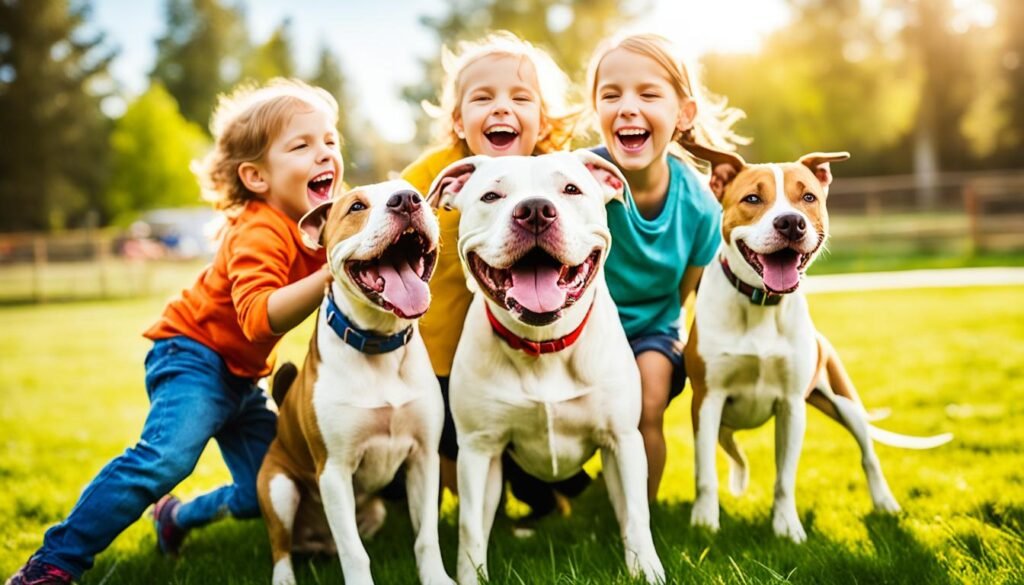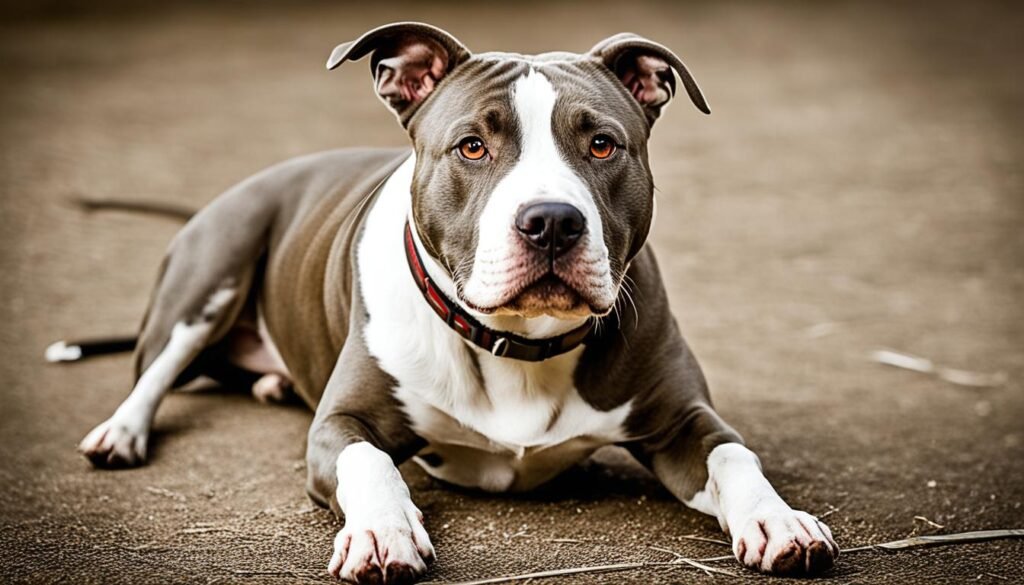Physical Address
304 North Cardinal St.
Dorchester Center, MA 02124
Physical Address
304 North Cardinal St.
Dorchester Center, MA 02124
Pit bulls often face a lot of talk that is not true. This article looks to share the real deal about them as pets. It gives you the right info to decide wisely about these often misunderstood dogs.

Pit bulls often get a bad rap and are seen as aggressive. However, “pit bull” is not a specific breed; it’s a broad term. It includes dogs like the American pit bull terrier, American bully, and Staffordshire bull terrier. Evidence doesn’t support the idea that pit bulls are born aggressive.
Originally, pit bulls had different jobs, like guarding or working in sports. But, how a pit bull acts comes from its breeding and how it was raised. Their behavior is influenced by their environment, what they are taught, and the love they get.
“It’s unfair to label all pit bulls as dangerous based on the actions of a few. These dogs deserve a fair chance at finding loving homes.”
Research shows bans on certain breeds don’t really keep communities any safer. Groups like the AVMA and ABA are against these laws. They say we should focus on educating pet owners and good pet care instead of singling out breeds.
The bad view of pit bulls mainly comes from the media and our own biases. When a dog attack is highlighted and the dog is called a pit bull, people’s fears grow. But, it’s important to know that breed doesn’t determine all of a dog’s qualities.
We should work on understanding pit bulls as unique creatures, not just as a stereotype. Each pit bull, like any dog, should be judged on their individual traits. This includes their behavior, training, and environment.
One big myth about pit bulls is their ‘locking’ jaws. People think they can lock their jaws to hold on tighter. But in truth, pit bulls don’t have jaw structures that are any different from other dogs.
There’s also a belief that pit bulls are naturally more violent. Yet, tests often show they are as friendly or even more so than other types, like Golden Retrievers. If any dog isn’t raised and trained well, it might show aggression.
Having any dog, including pit bulls, brings the duty of being a good owner. This means proper training, being social, staying active, and offering a great living space. Good owners meet their dog’s needs fully.
Given the right care, pit bulls can be great family pets. They are known to be loyal and loving. By doing our best for these dogs and changing how we see them, we improve life for all canines.
Many pit bull-type dogs are friendly and full of love, despite their bad reputation. They can be great family pets with the right care. Training and socialization are key for them to do well.
These dogs love to make their owners happy. A little training makes them loyal and well-mannered pets. They also get along well with other pets in the house.
“Pit bulls are incredibly friendly and eager to please. They crave human companionship and are known for their affectionate nature,” says Dr. Sarah Johnson, a renowned veterinarian who works with dog behavior. “With socialization and positive reinforcement training, pit bulls can thrive in a loving environment and bring immense joy to their families.”
Every pit bull is special with its own personality. Some are very outgoing, and others are more quiet. Starting socialization early and ongoing training will help each pit bull be their best.
Pit bulls are often quickly loved in new homes with their families. They show great loyalty and love their human friends deeply.
To be a good pit bull owner, remember they need lots of mental and physical activities. They should also have a balanced diet and plenty of care. Doing all this ensures they become friendly and valued family members.

Next, let’s look at the facts about aggression in pit bulls and clear up some of the myths about them.
Aggression in dogs doesn’t target specific breeds like pit bulls. Many people think pit bulls are always mean, but science doesn’t back that up. How a dog behaves mostly comes from its surroundings, like how they’re trained or if they’re abused.
Pit bull-type dogs actually do well on tests for friendliness and loyalty. Treat them with care and good training, and they’ll show their loving side. They can make great friends for people who know how to take care of them.
It’s key to see every dog as an individual. Including pit bulls. Giving them what they need, like love, training, and time with others, is important. If they get the right care, pit bulls can be just as nice as any other dog.

Pit bulls do best with training focused on rewards and praise. This shapes their good behavior and helps with any aggression. Starting them young to be around different people and animals is also a big plus. It makes them feel secure and friendly.
Being a good owner makes a big difference in how a dog turns out. All dogs need to be active, use their minds, and see friends, both human and canine. This keeps them happy and less likely to act out.
One idea about pit bulls is they can “lock” their jaw, making them more dangerous. This is false. They have normal jaws like other dogs do, and a “lock” has never been proven.
Another thing people wrongly believe is pit bulls are always risky, especially for kids. However, with the right care and watching, they can be sweet pets. Many pit bulls make great family dogs, bringing joy to homes with children.
Tackling these false ideas about pit bulls is crucial. By spreading true facts and promoting good pet care, we can help everyone see them fairly. This way, we build a better, kinder world for pit bulls and those who love them.
Biting can happen in any dog and isn’t tied to one breed. The chance of a dog biting isn’t based on its breed. Good care, training, and making sure dogs meet others can stop biting. Studies say that pit bull-type dogs aren’t more likely to bite compared to others.
“It’s key to know that any dog could bite, no matter the breed,” Dr. Jessica Smith says. “Biting mostly comes from being scared, anxious, or reacting to a situation.”
Pit bulls are found to be like other friendly breeds by many studies. They even scored well in a test from the American Temperament Test Society. This suggests they are friendly and have stable behavior.
Learning and good ownership keep dog bites from happening. It’s vital to train and let dogs meet many people and places when they are young. This helps them learn good ways to act and react.
The idea that pit bulls have jaws that lock is false. This myth creates a wrong idea about these dogs. Pit bulls’ jaws are not different; they are like any other dog’s.
Stopping biting is about training dogs right and being good owners. Here are tips to help:
With these steps and by being a good owner, your pit bull can be a good friend without being aggressive.

Remember, no breed is born to be mean or bite. Owners need to create a happy space for their dogs, making good behavior more likely. When we treat pit bulls fairly and understand the facts, we see how great they are.
There are many myths about pit bulls that aren’t true. These false beliefs paint pit bulls in a bad light. They keep the wrong ideas about them going, even though the facts say otherwise.
Many people think “pit bull” is a single breed. But, it’s a term for diverse types like the American pit bull terrier. The idea that all pit bulls are mean just doesn’t hold up.
Pit bulls can actually be quite loving and friendly. Every dog, including pit bulls, can differ in its nature. They show deep love for their human families. Research proves pit bulls are no more dangerous than other breeds when raised well.
It’s not true that pit bulls can lock their jaws. The structure of their jaw is the same as other dogs. These false ideas are born out of not having the right facts.

“Pit bulls are often misunderstood due to the perpetuation of these myths. It is crucial to rely on factual information and educate others to combat these misconceptions.” – Dr. Sarah Thompson, Animal Behavior Expert
Many believe pit bulls don’t fit in well with families, especially those with kids. But this isn’t true. With the right care, training, and socialization, pit bulls can make great family pets. Lots of families find happiness and love with their pit bulls.
The worst myth is that pit bulls are always mean. Aggression isn’t tied to any one breed. It’s more about how they’re raised and treated. We should look at an individual dog’s actions, not just its breed.
It is important to challenge these myths and educate ourselves and others about the true nature of pit bulls. By debunking misconceptions, we can promote a fair and accurate understanding of this misunderstood breed.
Pit bulls need special care, just like any dog. Many of them are great with families. They love both adults and kids. With the right care, they bring lots of happiness to families.
Pit bulls often face unfair treatment because of wrong ideas. But, research and stories show they can be wonderful pets. They just need to be loved and trained well.
Untrue stereotypes harm pit bulls. They wrongly say pit bulls are always mean and a risk. Yet, a dog’s behavior is shaped by many things.
“Pit bulls are not inherently aggressive or dangerous. They have the potential to be loving and gentle family pets like any other breed,” says Dr. Sarah Johnson, a veterinarian specializing in canine behavior. “It’s important to judge individual dogs based on their temperament and behavior rather than making assumptions based on breed stereotypes.”
Judging pit bulls by their breed is wrong. Training and a loving home are key. Through this, pit bulls can be wonderful additions to any family.
Pit bulls love their human families deeply. They are very loyal and show a lot of love. This makes them great friends for people of all ages.
“My pit bull is very loyal and kind,” says Jessica, who has a pit bull. “He’s gentle with my kids and always stays close. He’s like a loyal friend, always there for me.”
By spending time with them and playing fun games, pit bulls become even more lovable.
Being a good owner is crucial for a pit bull’s happiness. It means feeding them well and taking them to the vet. It also means giving them plenty of exercise and keeping their minds busy. Training is also important for them to know right from wrong.
Mark Thompson, an expert in dog training, says pit bulls do well with positive training. Using things like treats and praise helps a lot. It’s also key to set clear rules and reward good behavior.
Good training makes pit bulls not just friendly, but also mentally and physically healthy.
Each pit bull has its own, unique personality. Some love to run and play, while others enjoy resting. The key is finding one that fits your family’s lifestyle.
By being open and taking good care of a pit bull, your family can know the joy these dogs bring.
| Traits | Pit Bulls as Family Pets | Other Dog Breeds |
|---|---|---|
| Affectionate | ✓ | ✓ |
| Loyal | ✓ | ✓ |
| Gentle | ✓ | ✓ |
| Good with Children | ✓ | ✓ |
| Trainable | ✓ | ✓ |
| Protective | ✓ | ✓ |
| Playful | ✓ | ✓ |
Training is key for pit bulls, just like for other dogs. Giving them the right training and daily activities ensures a well-behaved pet. The challenges come more from their environment than from their breed.
Using rewards works well in training pit bulls. Give treats, praise, and love when they do what you want. This builds trust between you and your dog, making training fun.
Dealing with fears is important when training. Like all dogs, pit bulls may have their frights. Taking time to understand and help them boosts their confidence and security.
Getting your pit bull used to things is key to their happiness and behavior. Letting them meet different people, animals, and places is great. Start socializing them early and keep it up as they grow.
Make sure their social experiences are positive. Begin by introducing them to new places slowly. Encourage good play with other dogs and people.
“Training pit bulls needs patience and regular work. Show them love and respect, and they will surprise you with their ability to learn.”
Obedience training teaches pit bulls basic manners and commands. Use rewards to teach them to sit, stay, come, and leave it. They will get better at listening with regular practice.
Stay gentle but firm in your training. Always encourage good behavior instead of punishing bad. Keeping your commands and rewards consistent is vital for good training.
Pit bulls are smart and full of energy. They need both mental and physical activities. Agility training can be great for improving their focus and confidence.
Using puzzle toys or scent games keeps their minds active. Switch up their toys often to keep their interest.
Training pit bulls takes time and kindness. Address their fears, socialize them, and teach them good manners. Every pit bull is different, so adjust your training to fit their needs.
If you think pit bull-type dogs are great, there’s lots you can do to help them. This includes taking action in your area to improve their lives.
Educate Yourself and Others: Spread the word and clear up any myths about pit bulls. Learning the truth and sharing it with others is key. This helps change the view that pit bulls are not loving pets.
Advocate Against Breed-Specific Legislation: Some places have laws that target pit bull-type dogs. It’s important to stand against these laws. Ask your local leaders to find better ways to keep everyone safe, ways that include all dogs equally.
Support Local Shelters and Rescue Organizations: Many shelters work hard to help pit bull-type dogs find homes. You can support them in many ways. This includes adopting, fostering, or giving your time to help. Donating money or supplies also makes a big difference.
| Ways to Support Pit Bull-Type Dogs | Description |
|---|---|
| Spread Awareness | Share the truth about pit bulls to end myths and misunderstandings. |
| Advocate Against BSL | Stand up against laws that unfairly target pit bulls. |
| Support Local Shelters | Help shelters and rescues by adopting, fostering, volunteering, or donating. |
Getting involved can change how people see pit bull-type dogs. It helps promote responsible pet ownership. This way, these amazing dogs can lead happy lives. Together, we can make a community that cares for all dogs, including pit bulls.
In conclusion, pit bulls have faced wrong labels as aggressive and risky. But, when given proper care, training, and love, they can be amazing pets. It’s key to understand the myths about them and see them each as unique individuals.
Good care from owners is very important for pit bulls to do well. By stopping laws that target them and learning the real story, we can change how people see pit bulls. We should all work towards a world where these dogs are cherished for their true qualities.
We should believe in the great things pit bulls can bring to families. Let’s support them to show what great pets they are. Together, we can help them live happy lives without harmful judgments.
No, the idea that pit bulls are naturally mean doesn’t have strong proof. Like all dogs, pits can be gentle and caring if they’re raised well. This means giving them love, teaching them right from wrong, and letting them meet lots of people and other animals.
Biting isn’t something that depends on a dog’s breed, including pit bulls. What’s key is how the dog is brought up and trained. The odds of them biting can decrease a lot if they are shown the right way to behave and are given lots of chances to get used to various situations.
Many rumors exist about pit bulls, like thinking they’re all mean. People believe they’re more likely to attack, their jaws can lock, and they aren’t good for families. However, real evidence doesn’t back these up.
Yes, pit bulls can be amazing family pets with the right care, training, and socializing. They can add a lot of happiness and love to your family. Many pits are happily living in families right now. This shows that with the right effort, they make great companions.
Training pits takes time, doing the same things all the time, and rewarding them for good behavior. With these methods, pits can turn out to be really well-behaved. They just need a patient and kind guide to learn from.
To stand up for pit bull-type dogs in your area, make sure people understand the real facts. Fight rules that target just these dog types. Also, help local groups that rescue dogs by taking one home, caring for them temporarily, helping out, and giving what you can.